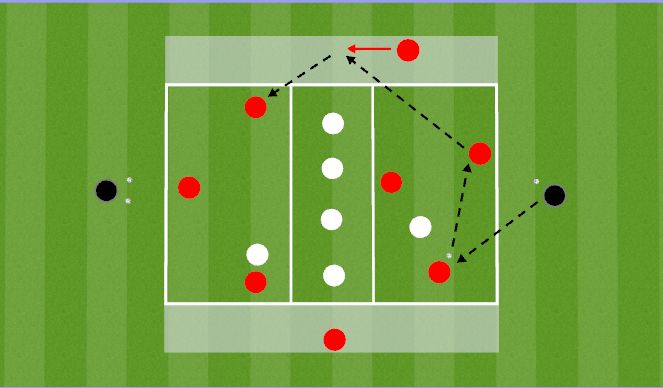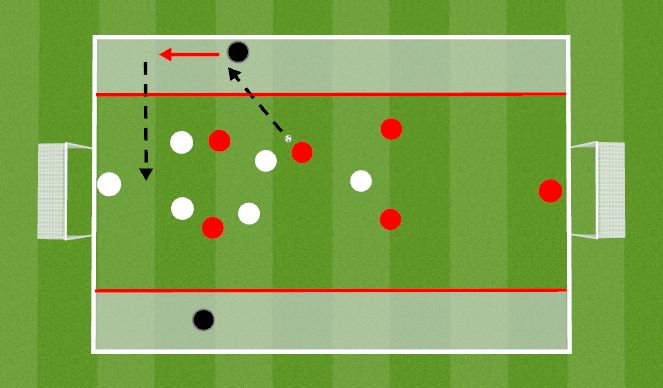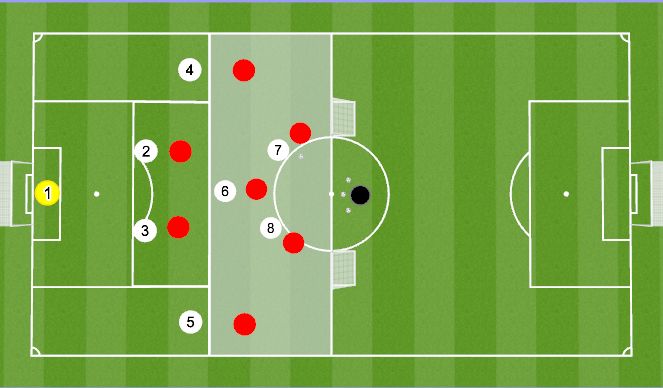Football/Soccer Session (Moderate): Understanding & exploiting width using positional play

Profile Summary

| Name: | James Horner |
|---|---|
| City: | Heckmondwike |
| Country: | United Kingdom |
| Membership: | Adult Member |
| Sport: | Football/Soccer |
Description
A selection of practices designed to help players understand their offensive positioning to best exploit wide areas.

See the guidance at the top of this page to understand why you are not seeing interactive Football/Soccer images.

Learning Objectives

|
Technical Wide players should look to receive the ball on the back foot with an open body to drive the ball forward quickly during transition. Look to play first time passes forward in transitions to evade the sliding defensive block. |

|
Tactical Ensure wide players keep their width and don't become drawn to the ball to constantly stretch the opposition, opening space centrally for more direct passages of play if necessary. Look to overload one side to draw in the opposition using bounce passes or dribbling with the ball, in turn freeing space and giving time for the wide player on the adjacent side. |

|
Physical Strength to shield and protect the ball in possible 1v1 duels. Speed and acceleration in wide areas to exploit the space available. A,B,Cs to increase chances of completing successful dribbles 1v1 or 2v1. |

|
Psychological Scanning to increase awareness of player positioning in target box, allowing for quick first time passes to score points with successful transitions. Decision making, when to try exploit the space and transition, when to continue working the ball to open space. |

|
Social Communication between teams to aid progression of the ball, helping direct player positioning and actions. Look to position players realistic to matchdays, defensive and offensive players together with wingers or fullbacks in wide areas, helping build and develop relationships as well as further understanding of playing styles and characteristics amongst players |

See the guidance at the top of this page to understand why you are not seeing interactive Football/Soccer images.

Learning Objectives

|
Technical Good first touch out of the body to ensure second one can be released with quality. First time passes if possible. Open body shape on receival using the back foot to set. When opposed can we exploit the 1v1, how can we beat our marker? Good technique when crossing or passing to forwards. |

|
Tactical Keep our width on both flanks to stretch opponents, don't be drawn to the ball. When opposed look to draw in a marker, ask for the ball, use bounce passes, freeing space centrally or on the adjacent wing. Look to time our runs, we want to be moving when we receive the ball, dribbling at pace with the ball makes it easier to exploit 1v1s. |

|
Physical Strength to shield and protect the ball in 1v1 duels. Speed and acceleration in wide areas to exploit the space and drive at defenders. A,B,Cs to increase chances of completing successful dribbles 1v1 or 2v1. |

|
Psychological Decision making, when to open up and drive at the space or defender? When to drop deeper to receive and circulate the ball, drawing out a defender. Scan to increase awareness, checking our shoulders for opposition and teammates positioning, aiding quicker and more decisive play. What type of delivery is required? Low cross, lofted ball, front or back post. |

|
Social Communication to aid verbal cues, when to play quickly, slow down or exploit with movement. |
Using width to overload the opposition (20 mins)
Area Size
36x48
How To Play
6v6 in central zone with two wide players being neutral, so whichever team has possession has an instant overload 8v6. The aim is to score from wide passes or crosses. If successful teams will score two points whereas simply scoring through central areas will only obtain 1 point. To begin wide neutral players will be allowed two touches max as play is those areas will be un-opposed. To progress the practice allow defensive players to enter wide areas but remove the touch limit for the wide players. Throw-ins as normal however no corners, play will simply begin from the GK. Leave footballs in the goals and around the pitch to emphasis quick play and exploiting overloads at speed.

See the guidance at the top of this page to understand why you are not seeing interactive Football/Soccer images.

Learning Objectives

|
Technical Look for good first touches and correct body positioning to set up the ability to run at pace towards the full back. Dependent on the scenario encourage players to dribble or run with the ball. Look for the correct technique when delivering the ball, dependent on type of cross or pass. Always be ready to receive possession from central areas, keeping on our toes, changing and adapting our body positioning. |

|
Tactical Keep the width on both flanks to stretch opponents and open play in central areas. Look to draw in a marker, moving to and from space, using bounce passes to move the opposition shape around. Timing runs, look to be moving when receiving the ball allowing us to dribble at pace. |

|
Physical Strength to shield and protect the ball in possible 1v1 duels. Speed and acceleration in wide areas to exploit the space available. A,B,Cs to increase chances of completing successful dribbles 1v1 or 2v1. |

|
Psychological Decision making, when to open up and drive at the space or defender? When to drop deeper to receive and circulate the ball, drawing out a defender. Scan to increase awareness, checking our shoulders for opposition and teammates positioning, aiding quicker and more decisive play. What type of delivery is required? Low cross, lofted ball, front or back post. |

|
Social Communication between teammates to aid progression of the ball, helping direct player positioning and actions. Look to position players realistic to matchdays, defensive and offensive players together with wingers or fullbacks in wide areas, helping build and develop relationships as well as further develop an understanding of playing styles and characteristics. |
7v7(+1) ATT v DEF (20 mins)
Area Size
60x45 (Half a pitch)
How To Play
Play starts from the coach just behind the halfway line. The ball must always be passed into a central player to encourage them to play wide as soon as possible. Teams will get four chances to attack. The attacking team will score two points if they can convert from either a cross or pass from either wide area. Only one player from each team can occupy a wide area, encouraging 1v1s and chance creation. Throw-ins played as normal however corners means play restarts from the coach. Once the attacking team have used four attempts, they switch with the 'defensive' team.








 Play animation
Play animation Play step-by-step
Play step-by-step Repeat (toggle)
Repeat (toggle) Full Screen
Full Screen Pause
Pause Stop
Stop
Using width to stretch & exploit defensive lines (20 mins)
Area Size
30x40 (wide areas 10x40)
How To Play
The in-possession team of three must ensure all players have touched the ball before attempting to play into the adjacent three. This can be done via a direct ball through the middle (1 point) or a team can score an extra point if the transition can be made via a wide player (2 points). This is to encourage our objective of exploiting wide areas. One defensive player can enter in to wide areas at a time with a maximum of two allowed to enter into a red third at a time. The teams of six will have four attempts to tally up as many points as possible before switching out for the defensive whites (wide players remain, unless switching between players that may play in those areas on gameday e.g. winger to fullback). If the ball is intercepted that ball is classed as dead and another is quickly played in by a coach on either side.